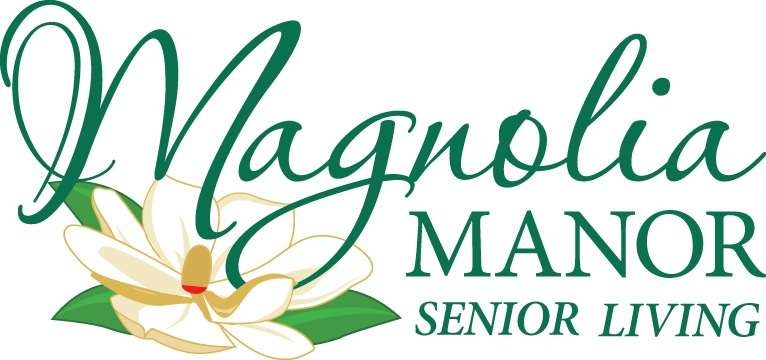Skilled Nursing in Georgia
Don't have time to read this now? Download a PDF version instead.
Skilled Nursing Services in Georgia
 Get that picture out of your head! Today’s nursing home is not the cringe-worthy “old people’s home” from the past that felt more like a warehouse than a residence. You may still hear the term nursing home, or convalescent center, but a modern Skilled Nursing Facility is enlightened, designed to provide an uplifting daily experience for residents who require complex, frequent, or around-the-clock ongoing medical care.
Get that picture out of your head! Today’s nursing home is not the cringe-worthy “old people’s home” from the past that felt more like a warehouse than a residence. You may still hear the term nursing home, or convalescent center, but a modern Skilled Nursing Facility is enlightened, designed to provide an uplifting daily experience for residents who require complex, frequent, or around-the-clock ongoing medical care.
This positive transformation is good news because:
- More than half of seniors 65 or older will need long-term care services at some point, and 33% will require nursing home level care. (The Centers for Medicare and Medicaid claims that number is closer to 40%.)
- 59% of Assisted Living residents will ultimately move to a nursing home, according to the National Center for Assisted Living.
- The average stay in a Skilled Nursing facility is 835 days.
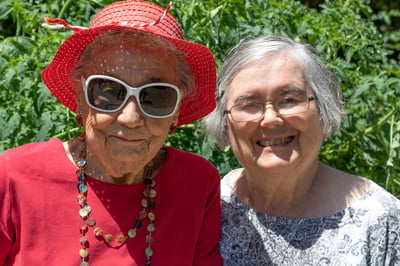 So, if you’re looking into advanced senior care options for a loved one or you are looking into what’s best for your own future, let’s take a realistic look at what today’s Skilled Nursing is all about.
So, if you’re looking into advanced senior care options for a loved one or you are looking into what’s best for your own future, let’s take a realistic look at what today’s Skilled Nursing is all about.
As America’s population ages, senior living accommodations of all types are increasingly in demand. There are communities that offer independent retirement living, assisted living, memory care, rehab services, and skilled nursing – often all or several levels of care.
Every state defines senior care facilities somewhat differently. In Georgia, definitions are as follows:
- SNF (Skilled Nursing Facility)- certified nursing facility with a Medicare provider agreement
- NF (Nursing Facility)- Medicaid nursing facility
- SNF/NF Dual Cert- certified nursing facility for both Medicare and Medicaid
- SNF/NF Distinct Part- the certified nursing facility is a distinct part of a rehabilitation center, hospital or another SNF or NF
- Licensed only- licensed by Georgia but has no Medicare or Medicaid certification
In short, it’s a place where residents, in some places still referred to as “patients,” receive 24-hour medical treatment from licensed professionals such as RNs, LPNs, and certified nurse’s assistants (CNAs).
In an Assisted Living community, you can get help with activities of daily living (ADLs) – functional things such as bathing and dressing, cooking or shopping, personal hygiene and using the bathroom. Staff can also dispense prescribed medications. In a Skilled Nursing environment, licensed staff can provide all types of medical care and monitoring as well as help with ADLs.
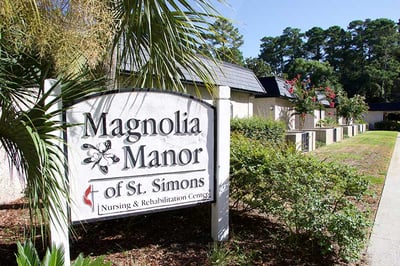 Magnolia Manor is a non-profit organization that serves seniors throughout Georgia with all levels of care. We are faith-based, but we welcome residents of all faiths into our communities, where we have two top priorities: outstanding personalized care and friendly, homey surroundings. Among our eight campuses, we offer Skilled Nursing at Americus, Columbus, and Midway.
Magnolia Manor is a non-profit organization that serves seniors throughout Georgia with all levels of care. We are faith-based, but we welcome residents of all faiths into our communities, where we have two top priorities: outstanding personalized care and friendly, homey surroundings. Among our eight campuses, we offer Skilled Nursing at Americus, Columbus, and Midway.
With a one-in-three chance that your aging Mom or Dad (or you, yourself) will require Skilled Nursing services, it’s smart to research the options now. The last thing you want is to make a difficult decision under pressure. Our team at Magnolia Manor is here to help whenever you have questions. We have also prepared this guide to help you get started.
As you read, you’ll learn about Skilled Nursing services and facilities, what this kind of care costs, how to pay for it, and – most importantly – how to choose the setting that’s just right for your situation. There is peace of mind to be found in knowing that you’ve made the right decision – that your loved one will be with caring medical professionals and staff who have your loved one’s best interests at heart, just as you do.
What Is Skilled Nursing?
Skilled Nursing provides medically necessary care beyond assistance with activities of daily living (ADLs) – the kind of care often needed to address chronic medical conditions. This might include:
- Catheter care
- Injections
- IV therapy
- Wound care
- Monitoring of medical equipment or vital signs
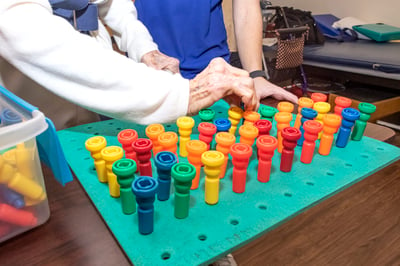 Services can also include therapy to help individuals recover or adapt skills lost or diminished as a result of a medical event or accident. There are three types of therapy that might apply:
Services can also include therapy to help individuals recover or adapt skills lost or diminished as a result of a medical event or accident. There are three types of therapy that might apply:
- Physical therapy, to improve range of motion, muscle strength, and balance
- Occupational therapy, to learn new ways of performing physical tasks (ADLs) to make up for new, permanent limitations in strength or dexterity
- Speech therapy, to re-learn how to speak or otherwise communicate and/or learn adaptive ways to prepare food to facilitate easier swallowing, typically following a stroke
Seniors can receive Skilled Nursing services at home, from appropriately licensed staff of home health agencies and physical therapists. For some, this can be a real benefit to prolong aging in place, whether the person lives in their long-time home or an Assisted Living community.
While aging in place is certainly everyone’s goal, the truth is that many seniors will eventually require more advanced help than they can get, affordably at least, at home.

Types of Skilled Nursing Facilities
Skilled Nursing facilities offer two types of care, temporary and long-term.
Your Mom or Dad may need Skilled Nursing services only for a short time. Often seniors who have been hospitalized due to a heart attack, a stroke, or a fall are not quite ready to go home even though they are ready to be discharged. Recovering skills needed for daily living may require more time and professional assistance. If Mom lives with you or someone else who can care for her, or if she lives in an Assisted Living community, she may be able to go home and receive therapy there.
However, a short stay in a Skilled Nursing facility can often speed recovery and improve outcomes because your Mom will have more time with therapist(s), more tools and equipment available to her to practice, and she can focus solely on getting stronger and getting comfortable with new skills if necessary.
At Magnolia Manor, all four of our Skilled Nursing Centers also offer rehabilitation services.
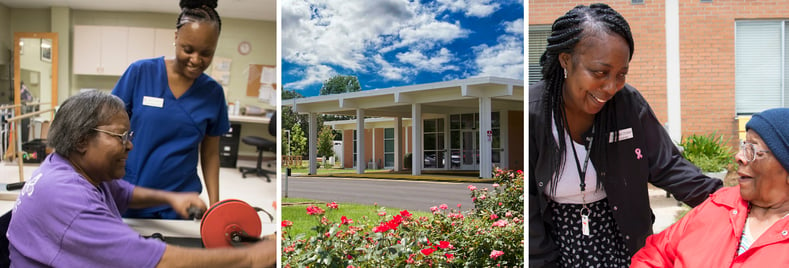
Long-Term Care Facilities
Facilities that provide long-term Skilled Nursing care are licensed and regulated by stringent federal and state laws. But that does not mean they are all the same. They can vary considerably in size and design, range of services, staffing, and ambiance. Some will meet the minimums required, others will go above and beyond on behalf of residents and families. At Magnolia Manor, our goal is always to do the utmost for every resident.
Nomenclature can be very confusing. You will see some sources that define Skilled Nursing Facilities only as temporary rehabilitation providers, while others refer to long-term care facilities as nursing homes. Mostly, though, Skilled Nursing Facility is the preferred, modern-day name for facilities that provide both types of service.
Entering either rehabilitation or long-term care requires a referral from one’s doctor or the discharging hospital.
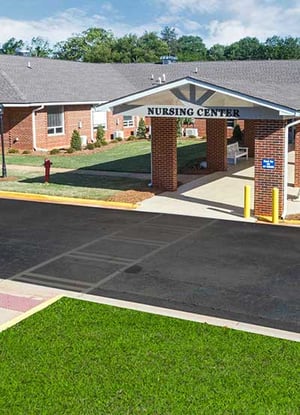 Continuing Care Retirement Communities (CCRCs)
Continuing Care Retirement Communities (CCRCs)
A Continuing Care Retirement Community is a senior living option in which residents buy in up front and are then able to receive whatever level of care they need as they age and their health challenges increase. So, your Mom could move into a CCRC as an Assisted Living resident, then later if she requires Memory Care and/or Skilled Nursing services, she would transition to that part of the community. Because these entities provide comprehensive care which cannot be predicted, the buy-in fee is very high. They also charge monthly for specific services.
At Magnolia Manor, we also offer a continuum of care that encompasses all levels of senior living and care needs, but we have a pay-as-you-go policy. So we charge monthly, based on the type of care. We take great pride in providing exceptional care and lifestyle at an affordable price.
Skilled Nursing Facilities (SNFs)
It is very important to note that not all facilities that provide Skilled Nursing services are Medicare or Medicaid certified. This affects payment options and may affect range of services or overall quality of care.
Memory Care
Many seniors who suffer from Alzheimer’s or another form of dementia are able to live in an Assisted Living type community, in specially designed surroundings that assure their safety. In much the same way, our Magnolia Manor Skilled Nursing Centers offer specialized care for Memory Care residents who also require advanced medical monitoring or treatment.
Myths about Skilled Nursing Facilities
Despite a wealth of information available about aging and senior living options, many myths and misconceptions just won’t go away. This is particularly frustrating for those of us who know better, and we want you to know better, too. Times have changed – especially in the field of Skilled Nursing. So let’s dispel some of the most persistent myths:
1. A nursing home is really just a hospital. There’s nothing to do.
Hospitals treat patients with medical conditions. Skilled Nursing Centers treat the whole person – residents who do, in fact, have medical conditions but who are also “treated” with stimulating activities for the mind, body, and spirit. Long-term residents may not be able to recover and go home, but they are able to do as much as possible every day.
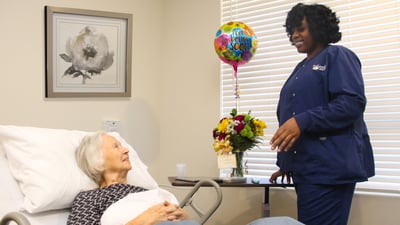 2. Once you’re there, you never leave.
2. Once you’re there, you never leave.
Rehabilitation services are a real boon to seniors because they enable someone who has been injured in a fall or suffered a serious health incident such as a stroke or heart attack to recover enough to resume their previous lifestyle. Sometimes rehab is faster and more effective when it takes place in a residential facility. The goal is for you to leave as soon as possible, in the best health possible.
3. There is no privacy.
Skilled Nursing residents live in semi-private or private rooms. Either way, staff and visitors respect that privacy and will not just waltz in without knocking, whether the door is open or closed. Residents are not required to stay in their rooms, and there are places for activities and socializing as well as dining.
4. Spouses cannot share a room.
Though this is not a common issue, spouses do have the right to share a nursing home room. This is a health benefit for couples as well as an emotional one.
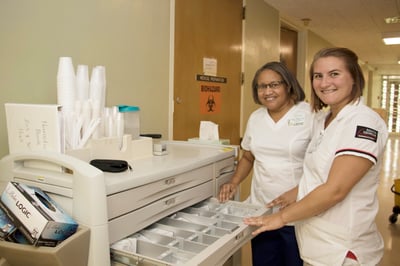 5. Care quality is not very good.
5. Care quality is not very good.
Certainly it’s true that not all Skilled Nursing facilities are the same, when it comes to quality of care, activities and amenities, or atmosphere. That’s why you want to research carefully to understand differences and how to pick the best place for your Mom or Dad.
However, one of the biggest improvements in nursing homes in recent years has been on the legal side. Residents now have clearly-defined rights that facilities must respect, including participation in development of their personal treatment plan. Staff must listen to residents’ concerns and do everything they can to accommodate preferences when it comes to activities, meals, and so on. You will be given a written copy of these rights, and you always have the right to ask questions until you get the information you need.
6. The food is awful.
Hospital food may be famously bland, but Skilled Nursing facilities are required to provide freshly prepared, appealing meals that are nutritious and appropriately hot or cold. As noted above, residents may express preferences and expect to have special dietary requirements met.
7. They drug you.
Residents are given prescribed medications according to doctor’s orders. Residents and family members can review the list of medications and have the right to refuse treatment. Medications being administered are also reviewed periodically by state inspectors and consulting pharmacists.
What Is It Really Like Living in a Skilled Nursing Facility?
Medicare-approved services provided in a long-term care setting include:-1.jpg?width=400&height=266&name=St.%20Simons%20Nursing%20Center%20-%20Private%20Room%20(2691)-1.jpg)
- A semi-private (shared) room
- Meals and dietary counseling
- Skilled nursing care
- Therapy as noted above
- Medications
- Medical equipment and supplies (used within the facility)
- Ambulance transport should you need to go elsewhere for services not provided by the SNF
But that’s just the beginning.
No more languishing in bed or parked in front of a TV for hours on end! The less seniors use their minds and bodies, the faster they lose their cognitive and physical capabilities. A study published by the National Institutes of Health noted, “Inactivity and social isolation contribute to strength loss, depression, and insomnia” among other problems.
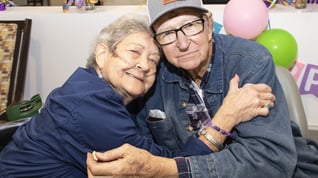 Researchers proved that activities such as walking, high intensity resistance training, and individualized social activities produced “significantly greater improvements in everyday function of [long-term care] residents.” It can also help slow progression of dementia and help prevent falls.
Researchers proved that activities such as walking, high intensity resistance training, and individualized social activities produced “significantly greater improvements in everyday function of [long-term care] residents.” It can also help slow progression of dementia and help prevent falls.
Every new Skilled Nursing resident is assessed by a team of medical and care professionals and family members to ensure they receive care that is personally tailored. Part of that is learning about your Mom’s likes and dislikes, from food to hobbies, entertainment and other interests.
In fact, Medicare and Medicaid certified facilities are required by law to provide ongoing programs that speak to the physical, mental, and psychological well-being of each resident. “Each resident has a personal identity and history that involves more than just their medical illnesses or functional impairments. Activities should address the specific needs, interests, culture, and background of the individual for whom they apply.”
Here at Magnolia Manor, we didn’t need the federal government to tell us this simple truth. We treat every resident like our own family, and don’t we all want the very best for our loved ones? Especially our elders! Well-rounded living situations lead to happier mood, better (and longer) sleep, and seniors who are stronger in every way.
At Magnolia Manor, We Care for the Whole Person

Everything we do at Magnolia Manor focuses on living. We want every resident to live their life to the fullest, whatever that means for them. Safe. Stress-free. Engaging. So, in addition to the highest quality medical care, our Skilled Nursing Center residents enjoy as many amenities as they want and are able to, from activities and entertainment to worship and pastoral counseling.
We may not be socializing quite the way we used to, due to COVID-19, but we do everything we can to keep every individual interested and engaged, and we look forward to the day when we can close the distance once again. We especially look forward to resuming in-person visits, and encouraging families to join their loved one for meals and activities as well as personal one-on-one time. No, it’s not exactly home the way it used to be, but it feels homey and comfortable.
What Does Skilled Nursing Cost?
Cost is an obvious question as you are investigating options for rehabilitation or long-term care. Be prepared for sticker shock. Skilled Nursing is the most expensive type of senior living accommodation because care is so much more extensive and much of it must be delivered by licensed medical professionals. Even for at-home services, costs can add up quickly as more care is needed.
Genworth reported in 2019 that the national average annual cost of a private room in a Skilled Nursing facility was $102,200. Semi-private rooms are more common and somewhat less pricey, but still very expensive. Back in 2015, Genworth reported that the average cost of Skilled Nursing in Georgia was $5,566 per month. Rates in Georgia are typically lower than the national average and lower than neighboring states.
 How Do They Charge?
How Do They Charge?
Continuing Care Retirement Communities charge a sizable buy-in fee, but they also charge monthly for certain living and care expenses. So even if your parent has moved into one of these communities or is considering that option, you should ask specifically about additional fees. By law Skilled Nursing facilities that are not part of a CCRC are not allowed to charge a buy-in fee, and most charge by the month, as we do here at Magnolia Manor.
But, again, you should ask about the details. What is included in the monthly fee can vary from one place to another. As an example, Medicaid (not Medicare) requires nursing facilities to provide residents (as part of the basic monthly cost) at least:
- Room and bed maintenance services
- Routine personal hygiene items and services
- Nursing services
- Specialized rehabilitative services
- Medically-related social services
- Pharmaceutical services
- Personalized dietary services
- Professionally-directed range of activities that meet each resident’s needs and interests
- Emergency dental care
Residents typically pay extra for things like phone, cable TV, reading materials, clothing, sundries, and similar personal items.
Ask about rate increases, too. These are inevitable over time, as the facility’s expenses to provide medical and living costs go up, and they may also add new amenities for residents. Nonetheless, some facilities tend to increase rates more often, or in higher increments, than others.
In order to accurately compare costs, you will want to consider what is covered and what is not. A monthly fee may seem lower, but if there are more out-of-pocket extras, the total will be higher. Not everything will be covered by some third party such as Medicare or long-term care insurance. Skilled Nursing facilities are required by law to provide written lists of their services and fees.
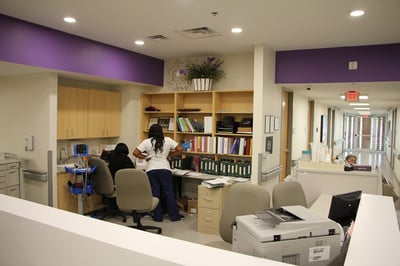 Also, keep in mind that the fees charged by any senior living community include more than basic rent, as the list above indicates. This is true for Assisted Living communities, though the list of included services is different. If your parent still resides in their own home, they are paying separately for these things plus property taxes, utilities, home maintenance, yard care, transportation, etc. so their total outlay each month may be considerably higher than their rent or mortgage payment.
Also, keep in mind that the fees charged by any senior living community include more than basic rent, as the list above indicates. This is true for Assisted Living communities, though the list of included services is different. If your parent still resides in their own home, they are paying separately for these things plus property taxes, utilities, home maintenance, yard care, transportation, etc. so their total outlay each month may be considerably higher than their rent or mortgage payment.
Nonetheless, Skilled Nursing is costly. Our easy-to-use cost of living calculator will help you understand and compare costs of Skilled Nursing at each of our Magnolia Manor campuses.
Above all, we know that financing is a highly personal issue for each of our residents. We go to great lengths to provide the highest quality care in homey, loving communities, but we also strive for affordability. So, please, don’t assume you cannot afford care at Magnolia Manor. We’re here to answer your questions and help in any way we can.
Paying For Skilled Nursing
Paying for Skilled Nursing
Especially because skilled care is so expensive, it is essential to understand all the potential funding sources that may be available to your loved one.
Medicare
Many seniors mistakenly assume that Medicare will pay for all their care as needs increase. But that’s not true. Medicare is health insurance – Part A covers hospitalization and related skilled services, Part B covers medical expenses, and Part D, if you have it, covers prescription drugs. If your Mom or Dad has a Medicare Advantage plan, their coverage may be more extensive.
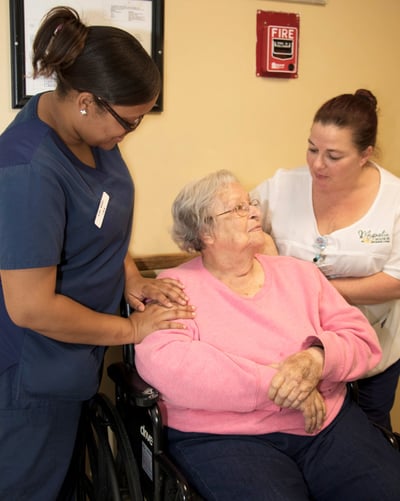 Once you move into a Skilled Nursing facility, your medical coverage for doctor’s visits, etc. and drug coverage do not change. Medicare does not cover residential costs. However, Part A does cover short-term stays in a Skilled Nursing facility for rehabilitation. In this case, Medicare will pay for up to 100 days – 100% for the first 20 days, then a portion of the cost for the remaining days. But only if you have been hospitalized for a qualifying three-day period and have been referred to rehab by a physician at discharge, and only if you go to a Medicare-certified Skilled Nursing facility.
Once you move into a Skilled Nursing facility, your medical coverage for doctor’s visits, etc. and drug coverage do not change. Medicare does not cover residential costs. However, Part A does cover short-term stays in a Skilled Nursing facility for rehabilitation. In this case, Medicare will pay for up to 100 days – 100% for the first 20 days, then a portion of the cost for the remaining days. But only if you have been hospitalized for a qualifying three-day period and have been referred to rehab by a physician at discharge, and only if you go to a Medicare-certified Skilled Nursing facility.
Patient cost in 2020 for days 21-100 is $176. If you must remain in rehab longer, you will be responsible for the entire cost. However, longer stays are rare. In some cases, other special situations may impact your Medicare coverage.
What if Mom or Dad is able to stay at home and receive Skilled Nursing services there? Medicare Part A does, in fact, cover some of these services, but you’ll want to be clear on the details.
Medicaid
Medicaid is a federal program that is administered separately (and somewhat differently) by each state. Seniors with limited assets are eligible for Medicaid, which unlike Medicare covers the cost of both short-term and long-term nursing home care. Medicaid covers skilled services in-home as well as in a residential facility.
While your Mom or Dad may not qualify for Medicaid now, many seniors eventually turn to Medicaid to pay for Skilled Nursing care once they have exhausted other assets. If you have chosen a Skilled Nursing facility that is certified by both Medicare and Medicaid, your loved one will not have to move in this event.
In Georgia, Medicaid will pay for Skilled Nursing memory care, even though it does not pay for memory care in Assisted Living situations.
 Personal Resources
Personal Resources
Unless (or until) you qualify for Medicaid, you will have to use your own resources to pay for long-term Skilled Nursing care. For most seniors, this includes funds from:
- Social Security retirement or other pension income
- Savings
- IRAs, other retirement accounts, or annuities
- Assistance from family members, if possible
Long-Term Care Insurance
This is increasingly popular, as so many adults realize they will need help paying for care as they age. Policies differ widely, but the most popular are hybrid options that serve as either life insurance or long-term care coverage, depending on what is needed during the policy-holder’s lifetime.
Home Equity or Reverse Mortgage
If your senior parent still lives in a home they own, either of these options may be a possibility. If they decide to sell their home, they may be able to get a bridge loan to provide cash while waiting for the sale to be finalized.
Figuring out how to pay for increasing care can be confusing, to say the least. Whether you’re still a youngish adult or already heading into your senior years, our free guide Making a Plan to Afford Senior Living is a tremendous resource. It explains all the potential funding sources that may be available and how to find out more about them. It is designed to help families as well as seniors themselves to develop a realistic picture of senior living costs and how to plan ahead to meet them. That said, it is almost never too late to delve into this critical issue.
How to Choose the Best Skilled Nursing Facility
Since SNFs can differ significantly, comparing them is not an easy task. It’s even more challenging because the care that will be provided to your Mom or Dad is literally vital. You will want to be extra-vigilant in researching and evaluating options, and if your elder parent is up to it, make sure they take an active part in this process. They are the one who will be living in whatever facility you choose.
If Mom or Dad lives with you or nearby now, you might be tempted to simply pick a place that’s closest so you can stay connected as easily as possible. It might turn out that this nearest option is also the very best, but don’t assume that, take the time to look at every detail. There is so much to consider!
Do start by picking a geographic location. If Mom or Dad currently resides some distance away, moving them closer could be a big benefit for them as well as you and other family members. Aging and increasing health problems are not for the faint of heart, and for most seniors having loved ones near is the biggest blessing.
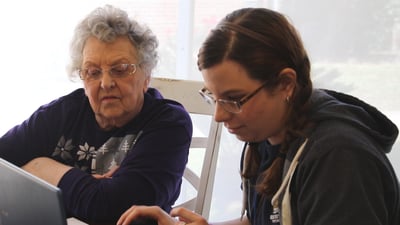 Once you’ve settled on geography, you can start your search by:
Once you’ve settled on geography, you can start your search by:
- Looking online. You can also use Medicare’s search-and-compare tool.
- Talking to your Parent(s) (or your own) primary care provider. They may have referrals for you that they can personally endorse, and in any case, they can tell you what specific services your Mom or Dad will need in the near term and, most likely, in the future.
- Asking around. Talk to neighbors, friends, your pastor and fellow church members to get referrals. Hearing about negative experiences can be instructive, too.
- Check with your local Senior Center. They usually have lists of senior living communities in the area, with contact information. The staff and/or seniors who are there for activities may also have personal recommendations to pass along.
Armed with your initial list, it’s time to start winnowing.
Questions to Ask
You will have questions, lots of questions. Skilled Nursing facilities are required by law to provide written information about their services and fees, and they are required to answer additional questions you may have. If it seems key staff are being less-than-transparent with you, that should be a red flag.
As you look into the specifics of each potential facility, you will undoubtedly think up more questions. Write them down, because you won’t remember all of them. Plus, you want to ask all the same questions of every facility you are seriously considering, so nothing gets overlooked. Medicare has prepared a handy checklist which will help – you can print out a separate list for each facility.
 Ask about everything:
Ask about everything:
- Are they certified by Medicare and/or Medicaid? Medicare also rates Skilled Nursing communities according to a 5-star quality rating system.
- Does the facility provide memory care? Even if your loved one is not showing signs of dementia now, that doesn’t necessarily predict the future, and having to change residences is especially hard on dementia patients.
- Staff-to-resident ratio (and types of medical professionals included in overall staffing)
- Staff training (licensed medical personnel should still get ongoing training on new care techniques, etc. – does this organization go above and beyond?)
- How resident treatment plans are developed and monitored, and how you and your loved one will be involved (you both have every right to participate and to veto any treatment or medication)
- The full list of services that are offered – medical, including any onsite specialists, as well as custodial (assistance with activities of daily living).
- Do they provide transportation if your loved one needs to visit the doctor or dentist?
- Monthly fees, especially a detailed list of what is covered and what is not.
- What insurance do they accept? (Mom’s supplemental Medicare coverage or long-term care insurance may pay for some options, otherwise it will be out-of-pocket for her or you.)
- Are private rooms available? (in some cases, doctors prescribe this, but residents who can afford it may choose to have a private room rather than sharing with someone else)
- Visitation policies (undoubtedly suspended due to COVID-19, but what is their “normal” policy regarding who can visit and when)
- Do they (and how do they) communicate with families to provide routine updates about their loved one?
- What kinds of programming are available to residents, onsite or off-site – social, educational, physical exercise, entertainment, pursuit of hobbies, etc. All facilities are required to offer activities, but this can be a major differentiator.
- Are worship services, religious study, and/or pastoral counseling available?
- Family support – one-on-one counseling, support groups, etc.
- Emergency plans – what will happen if there is an emergency within the facility or in the greater community?
- References from families of current residents
Specifically ask about the facility’s experience with COVID-19. Have they had positive diagnoses among staff or residents? What steps are they taking to protect everyone?
See for Yourself
No one wants to move to a place they’ve never laid eyes on. There is only so much you can glean from researching and asking questions, you need to see and hear and smell for yourself. Unfortunately, as long as COVID-19 restrictions remain in place, personal tours of Skilled Nursing facilities are not an option.
Nonetheless, you can use other means to get a better feel for each community – photos and videos and, again, asking lots of questions. Talking with families of current residents, as noted above, can be invaluable at this time. So can seemingly small details such as how staff answer the phone and how quickly they respond if you have questions or need a call-back.
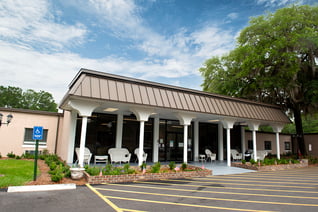 If you are able to visit in person, look for:
If you are able to visit in person, look for:
- Appearance of the grounds as you approach – sterile and institutional or cheery and welcoming?
- Tour the entire campus, to get a feel for external and internal ambiance and see how the facility is laid out. Is the place clean and fresh-smelling? Does it look and feel homey? What are personal rooms like?
- Security precautions and procedures.
- Observe residents and staff. How do they interact? Do staff know residents by name and seem friendly with them? Do both staff and residents look happy? Are residents engaged in something or just sitting?
- Don’t just look at the menu, eat a meal. Mom wants good food, and she deserves it! How far does the facility go to accommodate food preferences and special dietary requirements?
Schedule a personal meeting with intake staff to discuss Mom’s situation and ask questions. If in-person isn’t feasible, set a time to talk via phone or, better yet, do a video call so you can see the person’s body language and facial expressions as you chat. Be sure to have your written list of questions with you, so you don’t forget something.
Don’t Wait to Investigate Your Options
The earlier you narrow your choices, the better, because many types of senior living communities, especially the best Skilled Nursing Facilities, have waiting lists. That’s true for Magnolia Manor, too. However, we do give preference to current residents who find they need to move to a more advanced type of care. So if your loved one already resides at a Magnolia Manor campus in Assisted Living or Memory Care, they might not have to wait. We also do not charge a waiting list fee, as some facilities do.
There Is a Silver Lining
Whether we like it or not, long-term care in a Skilled Nursing facility is a future possibility for many seniors. But rather than fret in advance about potential negatives based on misconceptions and fear, we can arm ourselves with facts and understand our options. Moving into a Skilled Nursing Center is a transition, but it does not have to be a spirit-crushing move.
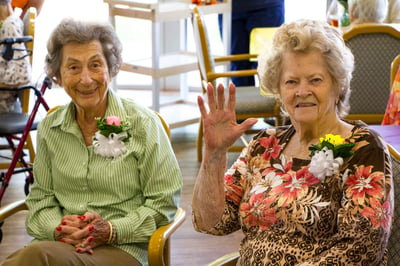 Whether your loved one resides in a nursing home longer or for less time than the average 835 days, there is ample opportunity to make the most of that time living life to its fullest despite significant and perhaps increasing challenges.
Whether your loved one resides in a nursing home longer or for less time than the average 835 days, there is ample opportunity to make the most of that time living life to its fullest despite significant and perhaps increasing challenges.
Nonetheless, we know it is not easy to accept advanced long-term care even when it becomes a clear necessity. We encourage you to talk to your pastor to find added strength within yourself, especially if you’re the adult child. It’s too easy to feel guilty about “committing” Mom or Dad, when what you’re really doing is making the most loving commitment to their health and safety.
Family support groups which we offer here at Magnolia Manor and friends who have had to make this same decision for their own parent(s) can be a real blessing, too. They know first-hand, so they can support you through the transition and also provide tips on helping your parent(s) glean every positive available in her Skilled Nursing community.
Once your loved one has moved in, don’t be a stranger. If you are nearby (and once we can all congregate socially again), we strongly encourage you to join her for meals and activities. Even if you aren’t near enough for that, do continue to take an active role in monitoring her care and urging her to take part in exercise, entertainment, educational, and spiritual activities.
Conclusion
We noted at the very beginning that a third of seniors will eventually need long-term Skilled Nursing care. And we noted that the average stay in a Skilled Nursing facility is over 800 days. Even if your loved one is there only for a short rehabilitation stay, you want them to have the best possible experience – personally as well as medically. You want them to feel loved and cared about as well as cared for. You also want them to be able to fill their days with interesting or entertaining activities as well as rest, to the best of their abilities.
That’s a tall order, and it will take time and effort to find the right home away from home for Mom or Dad. But it will be worth it, won’t it? Guided by our faith, we at Magnolia Manor believe that seniors and their families make good decisions like this, and we are always here to help. We hope you will call on us for advice, and we hope to soon welcome your loved one into one of our exceptional Skilled Nursing Centers.
